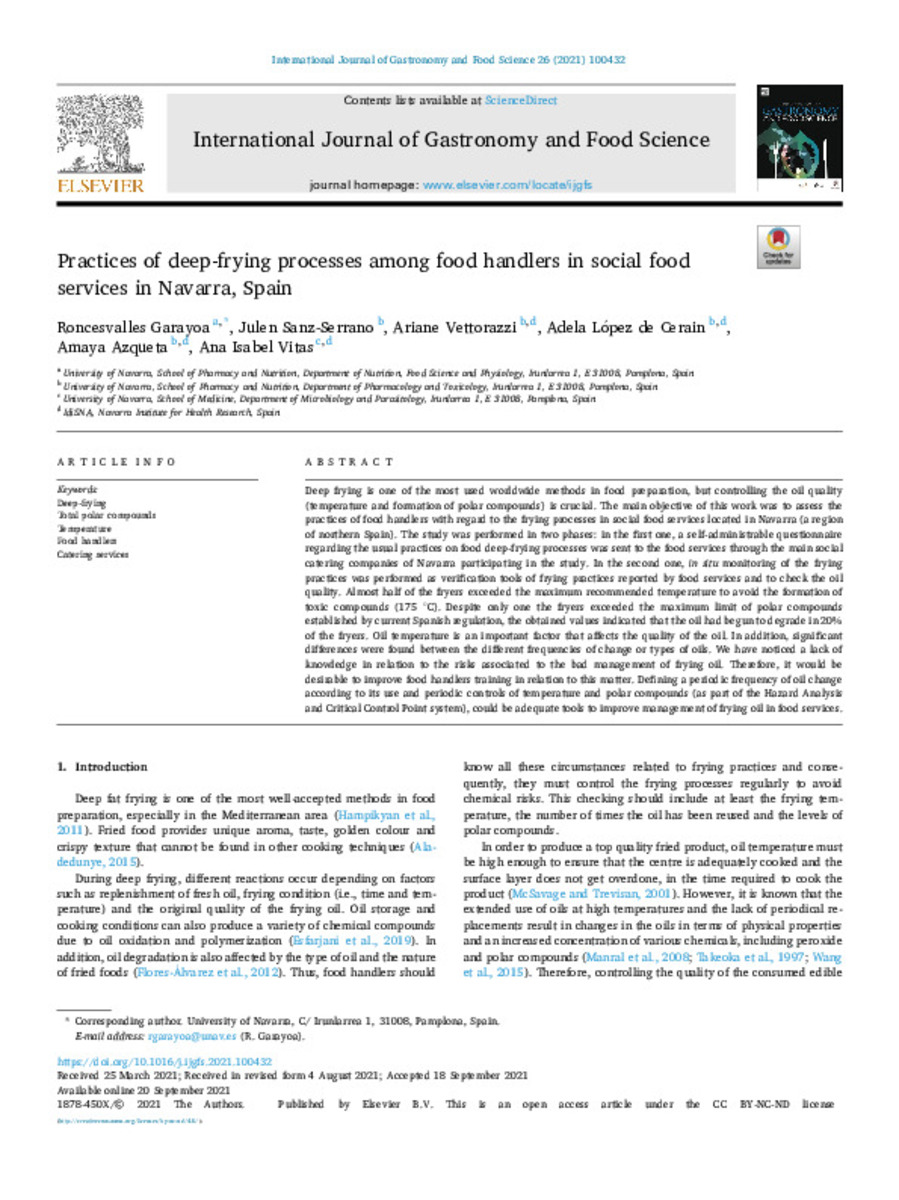Registro completo de metadatos
| Campo DC | Valor | Lengua/Idioma |
|---|---|---|
| dc.creator | Garayoa, M.R. (Mª Roncesvalles) | - |
| dc.creator | Sanz-Serrano, J. (Julen) | - |
| dc.creator | Vettorazzi, A. (Ariane) | - |
| dc.creator | Lopez-de-Cerain, A. (Adela) | - |
| dc.creator | Azqueta, A. (Amaya) | - |
| dc.creator | Vitas, A.I. (Ana Isabel) | - |
| dc.date.accessioned | 2022-04-13T09:54:51Z | - |
| dc.date.available | 2022-04-13T09:54:51Z | - |
| dc.date.issued | 2021 | - |
| dc.identifier.citation | Garayoa, M.R. (Mª Roncesvalles); Sanz-Serrano, J. (Julen); Vettorazzi, A. (Ariane); et al. "Practices of deep-frying processes among food handlers in social food services in Navarra, Spain". International Journal of Gastronomy and Food Science. (26), 2021, 100432 | es_ES |
| dc.identifier.issn | 1878-450X | - |
| dc.identifier.uri | https://hdl.handle.net/10171/63388 | - |
| dc.description.abstract | Deep frying is one of the most used worldwide methods in food preparation, but controlling the oil quality (temperature and formation of polar compounds) is crucial. The main objective of this work was to assess the practices of food handlers with regard to the frying processes in social food services located in Navarra (a region of northern Spain). The study was performed in two phases: in the first one, a self-administrable questionnaire regarding the usual practices on food deep-frying processes was sent to the food services through the main social catering companies of Navarra participating in the study. In the second one, in situ monitoring of the frying practices was performed as verification tools of frying practices reported by food services and to check the oil quality. Almost half of the fryers exceeded the maximum recommended temperature to avoid the formation of toxic compounds (175 ◦C). Despite only one the fryers exceeded the maximum limit of polar compounds established by current Spanish regulation, the obtained values indicated that the oil had begun to degrade in 20% of the fryers. Oil temperature is an important factor that affects the quality of the oil. In addition, significant differences were found between the different frequencies of change or types of oils. We have noticed a lack of knowledge in relation to the risks associated to the bad management of frying oil. Therefore, it would be desirable to improve food handlers training in relation to this matter. Defining a periodic frequency of oil change according to its use and periodic controls of temperature and polar compounds (as part of the Hazard Analysis and Critical Control Point system), could be adequate tools to improve management of frying oil in food services. | es_ES |
| dc.description.sponsorship | This work was supported by the BIOGENSA project (AGL. 2015-70640-R), financed by the Spanish Ministry of Economy, Industry and Competitiveness. J.S. thanks the Asociación de Amigos de la Universidad de Navarra and the Government of Navarra for the pre-doctoral grants received. A.A. has been financially supported by a research contract from the Ministry of Science, Innovation and Universities (‘Ramón y Cajal’ program, RYC 2013-14370) of the Spanish Government. | es_ES |
| dc.language.iso | eng | es_ES |
| dc.publisher | Elsevier | es_ES |
| dc.rights | info:eu-repo/semantics/openAccess | es_ES |
| dc.subject | Deep-frying | es_ES |
| dc.subject | Total polar compounds | es_ES |
| dc.subject | Temperature | es_ES |
| dc.subject | Food handlers | es_ES |
| dc.subject | Catering services | es_ES |
| dc.title | Practices of deep-frying processes among food handlers in social food services in Navarra, Spain | es_ES |
| dc.type | info:eu-repo/semantics/article | es_ES |
| dc.description.note | This is an open access article under the CC BY-NC-ND license | es_ES |
| dc.identifier.doi | 10.1016/j.ijgfs.2021.100432 | - |
| dadun.citation.number | 26 | es_ES |
| dadun.citation.publicationName | International Journal of Gastronomy and Food Science | es_ES |
| dadun.citation.startingPage | 100432 | es_ES |
Ficheros en este ítem:
Estadísticas e impacto
Los ítems de Dadun están protegidos por copyright, con todos los derechos reservados, a menos que se indique lo contrario.






